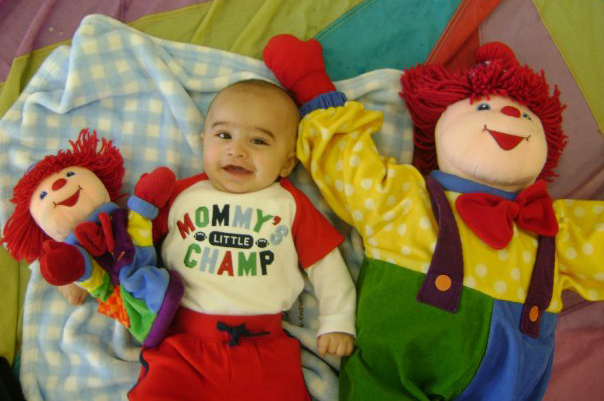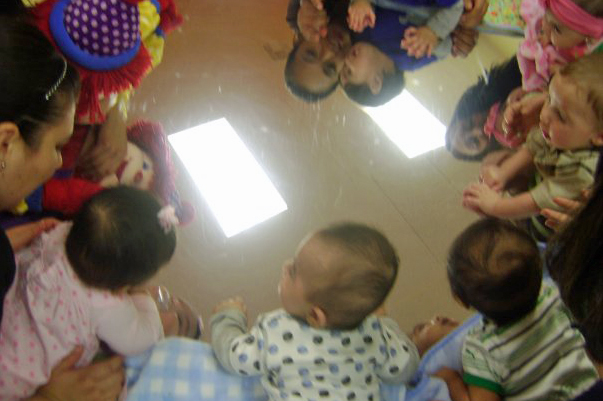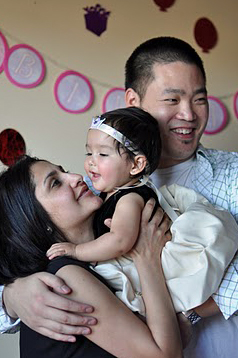As a mother waves goodbye to her child on the first day of preschool or daycare, many worrisome questions run through her mind. Being separated from one's child for the first time can be a difficult experience. However, a trustworthy early child care programme can provide confidence to parents when it's time to wave that very first goodbye.
Studies have revealed that the problem of access to education as well as later learning achievement could be linked back to the early years, which would explain why the Aga Khan Development Network places such emphasis on early childhood education in communities around the world. Early childhood – from birth to six years – is a time of intense brain development. Therefore, choosing a quality child care programme that caters to the child's developmental needs should be a top priority for parents.
Know your options
The many childcare options available to parents need to be explored fully in order to make an informed choice based on the unique needs of their child. For instance, preschool programmes are typically ideal for an older toddler or a young child (aged 2–5 years) because of their academic focus, while daycares are better suited to infants. However, many large and mid-sized daycares offer high-quality enriched learning programmes that prepare children for kindergarten years.
It is important to note that early childhood centers do not have to follow a creditable learning method – they may solely provide basic babysitting services. There are also home-based daycares that are licensed in US states and Canadian provinces. Some parents choose such programmes for their infants because the smaller teacher-child ratio results in more one-on-one care.
Another popular choice is the Montessori programme that focuses on self-directed learning in children, based on the teachings of Italian educator Maria Montessori. The method relies on nurturing a child's natural curiosity as the child's various individual interests are at work.
For infants under the age of two, some parents opt for exclusive care inside their home and hire nannies or au pairs to provide the right care. When selecting such individuals, parents should perform the necessary background checks and inquire about the candidate's education, driving history and years of experience. There are many agencies that do the necessary legwork for a fee.
Salima Loh in Alberta hired a nanny for her infant daughter, Sarei. “At about 2.5 years of age I hope to enroll her into a transformational programme like a Montessori rather than the play-based programme,” says Loh. “I believe that there should be a good balance between self-directed learning and structured learning.”
In the United States, Learning Center for Parents & Children (LCPC) is an Ismaili community-based early childhood programme operating in four Jamati regions: Southwest, Midwest, Southeast, and North Texas. The one-day-a-week programme utilises a spiral curriculum based on best practices from a variety of early childhood development models. Through rigorous and effective teacher training and the requirement of parental participation, LCPC seeks the child's total development and broader learning.
It is imperative that parents know how to distinguish between such options and make the right choice for their children.
Selecting a quality learning programme
According to the Centre of Excellence for Early Childhood Development in Montreal, a high-quality child care centre responds sensitively and appropriately to children's individual needs, stimulates their curiosity and recognises their particular interests. Additionally, it encourages cooperation, following instructions and the development of social skills.
Amina Sherali operates a preschool in Texas and believes that at the preschool age, a child is merely beginning to explore his or her surroundings. A quality teaching method, she says, should encourage the natural development of children's social and physical skills, as well as allow them to build their self confidence. Sherali, who has over 20 years of experience working with young children, provides ample opportunities for constructive play-time in her programme.
“A good child care programme should facilitate the natural inquisitiveness of a child,” says Sherali. “Children do not need to be taught; they learn from play and by exploring.”
Anil Karim, director of a Montessori preschool in Texas agrees. “During the early childhood years, children do not learn, but rather they learn to learn,” he says. Both Karim and Sherali are firm believers of taking the learning process gradually and advise parents against pushing children towards advanced academics too soon. They suggest that a good early childhood programme should reflect an understanding of how children learn and empower them with prerequisite skills for learning later academic tasks.
According to Karim, the essence of early childhood education lies within the five domains of development: physical, social, emotional, cognitive, and language. The milestones within these five domains are typically achieved during the early years.
“A good school should recognise a red flag if a certain development milestone is not reached,” says Karim. “If these natural domains are properly tackled and measured during the early years, then academic achievements such as reading and writing will come quicker when children are ready for school.”
Staying informed about licensing
Parents should have a general understanding of how the licensing of child care facilities in their states or provinces work. Such regulations ensure that care providers meet adequate educational and training requirements and their facilities get inspected on a regular basis.
When selecting a home-based daycare, it is advisable to ask the caregiver to show proof of proper licensing requirements. Moreover, several national organisations have developed accreditation programmes to recognise excellence in childcare and early childhood programmes, such as the US-based National Association for the Education of Young Children (NAEYC) and the Alberta Association for the Accreditation of Early Learning and Care Services (AELCS) in Canada. The accreditation process is voluntary and not required by law.
Certain states also maintain their own database of childcare facilities that parents can access for useful information. For instance, in Texas, the Department of Family and Protective Services has an online public database that lets users see how many times a centre has been cited for noncompliance and – crucially – how quickly it responded to such complaints.
Observing the environment
When evaluating a childcare centre, the look and feel of its environment, its state of cleanliness, hygiene, adherence to safety protocols, the general mood of the children, and nutritional standards are important indicators. Observe the classroom surroundings and learn about the hygiene policies at the centre. How often are toys, counters, floors and common areas cleaned and disinfected?
Take note of how caregivers interact with other children. A good caregiver has a degree in early childhood education or a similar field, and can provide the right stimulation to children, including being knowledgeable about the needs and reach of each individual child.
“Follow your instincts,” says Nazmina Kheraj, president of a child enrichment centre in California. “If you do not feel comfortable, then there is an issue.”
Inquire about the teacher-child ratio, which varies between jurisdictions. For infants, 3–4 children per teacher is generally considered acceptable and this ratio increases as the child gets older. “My daughter Serena attends a preschool with a ratio of about five to six children per teacher,” says Fareeda Chagani, a parent who is also pursuing her masters in early childhood education. She expressed her satisfaction with the child to adult ratio at her daughter's child care.
Along with formal education in early childhood, trust and crisis management are two general traits that all caregivers must possess. Parents should interact with the caregivers and learn about their skill levels. Additionally, make a point to inquire about the policies related to hygiene and nutritional standards. For instance, be knowledgeable about a facility's policies regarding sick children and prevention of germs and bacteria. Parents can also ask to see the weekly menu to check the nutritional value of meals being served to their children.
Networking with peer parents
 Nestled among his toys, 5-month-old Shanil Amlani will have a variety of childcare programmes to choose from. Jasmine Amlani
Nestled among his toys, 5-month-old Shanil Amlani will have a variety of childcare programmes to choose from. Jasmine AmlaniOne way of learning about reputable childcare programmes in your area is to ask around for referrals at work, within friend circles or at community gatherings. Kheraj, who is also a mother of two young boys, advises parents to get referrals from peers. “Join nearby mom groups and organisations and find out what the best available options are out there,” she suggests.
Salima Karim's two children, both under six years of age, attend an Ontario Montessori preschool close to their home. “We researched schools in our area both through the Internet and speaking to people,” said Karim. “The key is to know what your expectations are of a school before enrolling your child.”
When parents identify a quality child care programme through careful research and planning, that first good-bye wave is sure to come with a bit less heartache.










